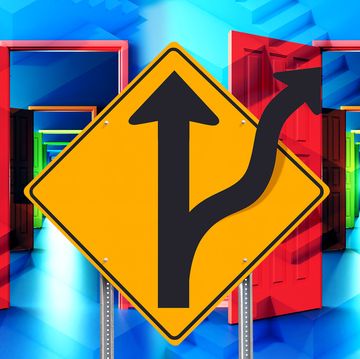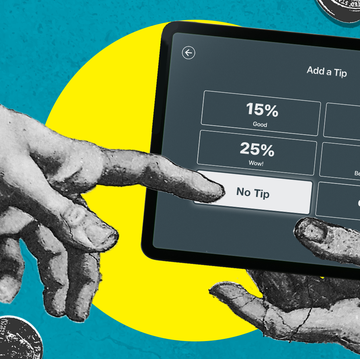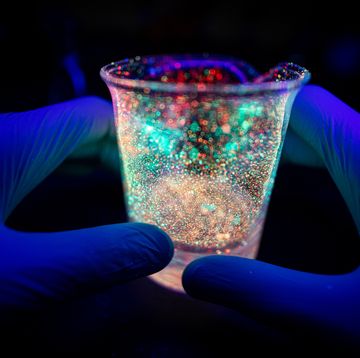Your final act on this planet may well be reaching for your phone.
Every day, nine drivers buy it that way. And we all know what they’re distracted by, don’t we? That oh-so-clever text they just can’t avoid reading. That request to buy milk. Or that (not in any way) urgent inquiry: When will you be home?
How about never?
In the time it takes you to locate the phone, pick it up, read the text, register the one-liner, and put the phone down—say, four seconds—there’s ample time to drive into the back of a parked eighteen-wheeler.
Related: The 5 Fastest Ways That Men Die
A few weeks ago, a 40-year-old woman died like that. I know, because I’m part of the sheriff’s team that responds to emergencies in Houston.
My teammates found the woman with her left hand on the wheel, and her head turned toward the phone in her right hand. Upon impact, she had crushed the phone into a figure-8 shape with her death grip.
There were no signs she’d attempted to evade the truck or even slow the vehicle.
Then it was our job to break the news to her horrified relatives. Perhaps one of them had sent the text that broke her concentration and ended her life.
But she wasn’t alone in the temptation to read and drive. Even sane people do it. But why?
This FAQ has answers, but none of them are any good to a dead woman with a crushed phone in her stiffening fingers.
It’s not too late for you, though.
If it’s so dangerous, why would sane people text while driving?
It’s simple. Their phones make them insane. Temporarily.
I’m a responsible driver though. So I’m smart about texting. I only do it when it’s safe, like at a stoplight.
Say the light turns green. You’re looking at your screen. The teen driver coming up behind you in daddy’s old monster of a truck (so she can be safe) hasn’t looked up from her Instagram since she saw the light change to green 100 yards back. You have to watch your six, Maverick.
Just because you’re a good, experienced driver doesn’t mean everyone around you is.
Related: 100 Ways to Live Forever
Texting doesn’t seem like such a big deal though. It only takes a second.
No, it takes closer to 5 seconds. Anything that takes your attention from the road for longer than 2 seconds is too long for you to live while doing it routinely.
The problem is, we can’t help ourselves. We’re addicted to texting. Or more accurately, texting is a symptom of the underlying disease. We are addicted to instant communication and information.
Addicted? Really? That sounds melodramatic.
Research shows us texting is a dopamine-driven behavior. As explained by Dr. Susan Weinschenk, Ph.D., a psychologist and professor at the University of Wisconsin, every text we receive is a reward—a delicious, soul-satisfying bit of information or human contact.
We are social creatures, protected by our herd, so we are biologically driven to foster connections, in order to better our chances of survival.
We hear our text alert, and we react as if our lives depended on it.
Unfortunately, we can never get enough. We’ll seek out the reward constantly, even though some of us will kill ourselves in the process.
Weinschenk, refers to a classic study involving this behavioral addiction cycle. “The labratory rats would keep pressing the bar for brain stimulation, and they weren’t eating,” she says. “They’d rather have the brain stimulation than anything, even food. And they’d die of starvation.”
So when they say texting while driving is like drunk driving, that’s not an exaggeration?
Not at all. We’re screen-drunks. They should make a phone case that looks like a brown paper bag. We could all carry them around, bumping into things and falling into mall fountains.
We get behind the wheel and just keep taking little nips of Twitter, or Facebook, or whatever digital hooch is our poison. Nothing is more important to the addict than getting the next hit.
We act that way behind the wheel when we text, or find our favorite song in iTunes, at 60 miles an hour.
Hitting rock-bottom is bad, but it often allows people to confront and learn to control their addictions.
Hitting rock-bottom while driving a two-ton SUV is last call.
(Take back control of your life by picking up a copy of The Better Man Project, the new book from the Editor in Chief of Men's Health. It's got 2,476 tips and techniques that will flatten your belly, sharpen your mind, and keep you happy and healthy for life.)
Well, if we’re powerless, what can I do about it?
You can take control back from the matrix that enslaves us. Be the master of your phone, not its bitch. Make a choice not to act like a lab rat.
If you can’t bring yourself to set your devices to airplane mode, stow your rig in your gear bag or closed console. Bluetooth will still connect you to hands-free phone and texting services found in most modern vehicles.
Isn’t there a way to make it safer? What about self-driving cars? Or Amtrak?
Absolutely. As the tech gets better, we won’t have the problems we have now.
Then you won’t have to worry about driving distracting you from more important things, like Snapchat.
If you can make it to the future in one piece, we’ll be living there soon enough.













